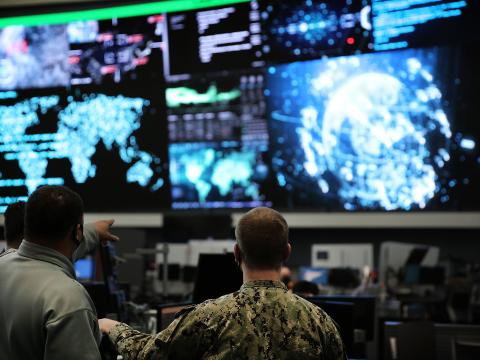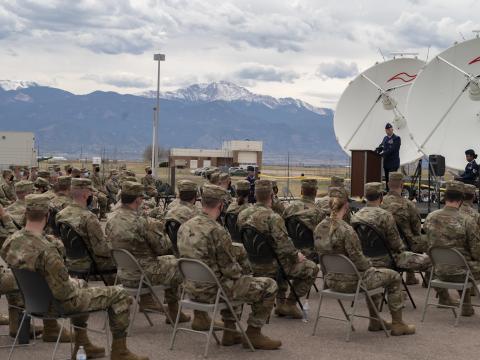Iraq Embarks on Technology Path
U.S. personnel assist Iraqis in pursuit of building first-class information infrastructure. 
Members of the Iraq Communications Coordination Element (ICCE) team meet with Iraqi leaders to discuss plans for the country’s information and communi-cations technology future. The bi-monthly working group meetings give team members the opportunity to present new information about requirements and to ascertain how Iraqi leaders wish to proceed.
A team of communications experts is laying the cornerstone now for the information technology future of
Brig. Gen. Steven J. Spano, USAF, deputy chief of staff, Multinational Force–Iraq (MNF-I) communications and information systems (CIS), is leading the Iraq Communications Coordination Element (ICCE), a team formed to help make a difference in the information technology conditions in Iraq. The project’s development began almost immediately after Gen. Spano arrived in
“It was clear during his [Gen. Hawkins’] year here that the security conditions were not conducive to diverting resources away from direct support to the warfighter to helping rebuild
But Gen. Spano understood the direct tie between ICT supporting the coalition and helping rebuild
After meeting with
Based on this assessment, the general framed a broad vision of his goals for his year in
Gen. Spano and his staff determined that the second focus area would be to continue to mature the
Leveraging the joint enterprise was identified as the third priority. This would be achieved by building an integrated knowledge management system across the MNF-I, Corps and Multinational Security Transition Command–
The final focus area was building a staff and vision to improve assistance to the Iraqi government to help it rebuild the country’s ICT in terms of policy, services and infrastructure.
It was this last priority that Gen. Spano brought to Gen. David H. Petraeus, USA, commanding general, MNF-I. “He said, ‘Let’s move out and stand up a fusion cell.’ Thus, the ICCE was established and formalized,” Gen. Spano explains. Comprising 10 individuals, the ICCE is possible today because the time is right, he offers.
With the go-ahead to move on creating the ICCE, staffing the team became the next challenge to overcome. With no specific military skill sets to draw from, nor the manpower available to devote to this project, the general’s staff turned to the U.S. State Department personnel in-theater who had some experience in the area. While not formally assigned to the ICCE team, these government employees have been “great partners to work with,” he says, adding that a similar relationship was formed with personnel from the
The formal ICCE team was built from the ground up. The general and his staff searched for high-energy leaders who could think outside the box, be self-starters to root out information, network with local government officials, see what needed to be done and then just do it.
The Defense Information Systems Agency (DISA) was one source of personnel; the agency has two small teams in
The U.S. Air Force also provided staff for the ICCE. Five communications officers who were preparing to join the Global War on Terrorism arrived three weeks after Gen. Spano’s request for personnel, “much faster than I thought possible,” he quips.
“As we began to craft the vision and charter for the ICCE, we knew we needed expertise from industry, academia and even an interpreter. We added a management consultant on loan from the TF BSO—a valuable interpreter—and have gotten great support from the
The ICCE team wrapped its vision around the three major areas of policy, services and infrastructure. Team members then dispersed to seek out information about the current state of the country’s communications capabilities. They began speaking with members of various ministries, staffs, former ministers of communications, the prime minister’s head information technology representatives and anyone who could offer insights about past, current and future projects. They gathered information about policy and law, services such as the Internet and wireless communications, and infrastructure, including fiber, microwave, landlines, cell phones and cross-border connectivity. “The goal was to get to ground truth in these areas so we could identify what wasn’t being done that needed to be done and to offer considerations that might better match priorities to resources,” Gen. Spano relates.
 |
| ICCE teammates include (l-r) Ehab Hosny, translator; Capt. Michael Fischer, USAF; Maj. Brian Bakshas, USAF; Lt. Col. Lisa Richter, USAF; 1st Lt. Aaron Smith, USAF; Col. James King, USMC; Capt. Barnard Cross, USAF; Capt. Carolyn Hackworth, USAF; Maj. Sam Laboy, USMC; Maj. Wade Buhler, USAF; Jeremy Elders, support contractor; Lt. Col. Paul Haffey, USA; and Capt. John Amann, USAF. |
ICCE team members also are engaged in an information campaign to advertise themselves as the single comprehensive source of information on telecommunications and the information technology projects in
The general emphasizes that the ICCE continues to work with ministerial-level officials in the Iraqi government, exchanging new ideas, discussing challenges and listening to their requirements. In addition, team members are tapping into other forums, such as the Information Technology Developers’ Working Group, which is co-chaired by an ICCE team member and includes information technology developers from numerous entities in the
“It is important to note that we are not trying to build the Iraq ICT for the government of
Although current circumstances are less than conducive to immediate progress in communications policy, services and infrastructure, Gen. Spano is not discouraged. “We can neither command change nor sit back and wait for it to happen. Both are recipes for inaction and continuation of the status quo. Whenever attempting to lead change, there is always the danger for leaders—be they CEOs or military leaders—to fall into the trap of trying to command change,” he says. “Arrogance diminishes the clarity of righteousness. While we may be right in all the advice we give, if the change is perceived as coming from an outsider commanding it, that change will likely be perceived as attacking the culture, values and ultimately, the comfort zone.”
This perspective is pervasive in the way the general views the manner in which the ICCE team is collaborating with Iraqi leaders. “We have to work to build trust by listening, respecting their opinions and ideas, letting them make decisions both good and bad, writing the statements of work, creating strategies and allowing them to fail and learn from their mistakes. We have to feed their pride by allowing them to lead the change rather than to strip that pride with well-intentioned motives designed to get to the same place but faster. This is our challenge, and it is both frustrating and exciting. We’re learning a lot about ourselves in this process,” he shares.
While it is not making the decisions for them, the ICCE encourages Iraqi leaders to model their country’s ICT infrastructure, management of frequencies, licensing practices and associated business processes on proven best practices. The benefits of this tack will emerge as the country begins to leverage the private sector to meet its needs in this area, the general notes.
The approach the Iraqis should take for its information technology governance is “a bit more challenging,” Gen. Spano allows. The country must develop its structure within the framework of its ideology and culture, so Iraq is not likely to follow the examples of the United States, where individual privacy rights are determined by laws, and freedom of speech—even opinions some Americans may find objectionable—is protected by the Constitution. The U.S. State Department is taking the lead in assisting the Iraqis in this area, the general relates.
The ICCE team plans to encourage the Iraqi government to participate actively in any Gulf region alliances for communications improvements. It envisions the country partnering with countries such as
Gen. Spano is cautiously optimistic about
“Once broadband Internet service is widely available and affordable, the growth of the PC and Internet-based businesses in
The general believes there will be a concerted effort to build a major fiber optic network linking
“Ultimately, I can envision the commercial infrastructure we are building and connecting merging with the effort to rebuild
Web Resource
Multinational Force–Iraq: www.mnf-iraq.com
The Ground Truth About Iraq’s Infrastructure The Iraq Communications Coordination Element (ICCE) began its work helping the Iraqis rebuild their information and communications technology (ICT) by acquiring information about existing systems. Members of the team fanned out and collected data from Iraqi leaders in various government and commercial sectors to find out about the country’s communications infrastructure. What they found was a country living in the analog world, says Brig. Gen. Steven J. Spano, USAF, deputy chief of staff, Multinational Force– Iraq (MNF-I) communications and information systems (CIS). “It was a cash-based society, and as a result, corruption was common and trust was tenuous. Many people lived in fear, so using information and communications technology was considered dangerous and therefore not encouraged. Most services were provided by two state-owned enterprises: the state-owned Iraqi Telephone and Postal Company (ITPC) and the State Company for Internet Service. Internet use was not widespread and business practices not modernized. “With that as a backdrop, fast forward to the past six months. There has not been a permanent minister of communications for six months. The acting minister for youth and sports is the acting minister of communications. The director general for ITPC is within weeks of retiring. The head of the Communications and Media Commission—the government regulator of frequencies, licenses, etc.—stepped down in mid-April. As such, the two main ministries charged with leading ICT are vacant or do not have a permanently appointed minister with ICT experience. The prime mMinister is working to fill these vacancies, and we hope to see a change soon,” Gen. Spano relates. The ICCE team also is facing a physical communications infrastructure that poses challenges. Other than in the northern regions where some new fiber infrastructure is in place, the country consists of a pre-Gulf-War fiber network that is more than 25 years old in most places and has been heavily damaged by ongoing operations. The minister of communications’ initiative to modernize this infrastructure, an effort called Project 23, calls for putting new switches and routers on the existing 25-year-old fiber. In addition, cross-border fiber connections into neighboring countries do not exist, so long-haul communications requires a satellite communication capability. No operational microwave system currently exists in Some limited wireless local loop service exists in the country, primarily provided by the commercial sector. Management of “Internet is growing slowly, with the State Company for Internet Service servicing approximately 230,000 users. Although there is no way to quantify the number, we are told a large ‘gray market’ of unlicensed Internet cafés exists. “One of the biggest successes in |



